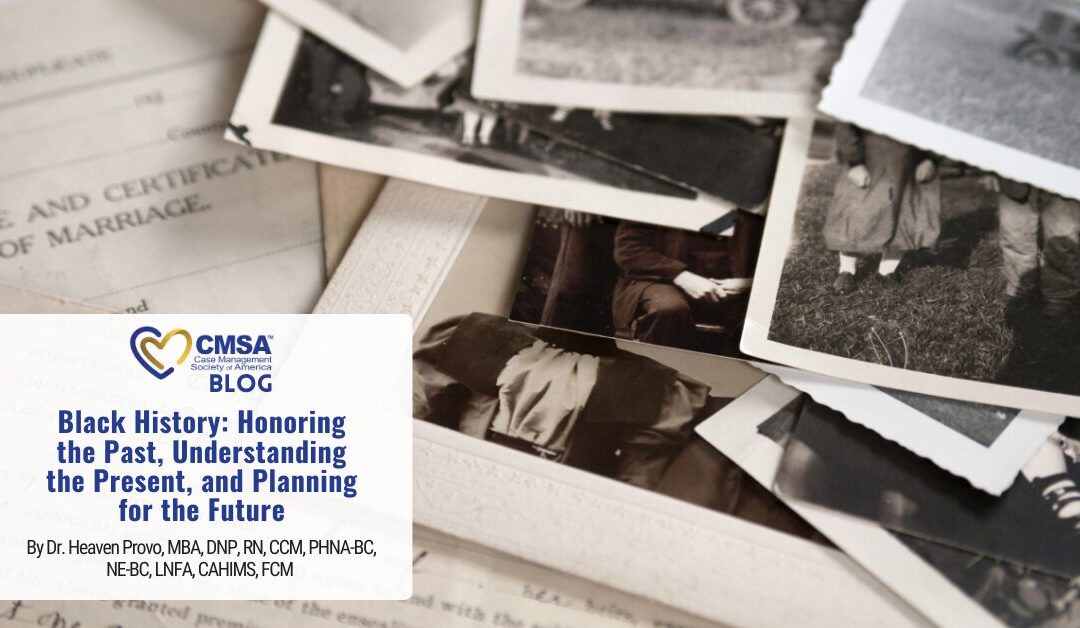By Heaven Provo, MBA DNP RN CCM PHNA-BC NE-BC LNFA CAHIMS FCM
This month, many pause to acknowledge Black History. In the context of healthcare and case management practice, you may wonder how this impacts you and the work that you do on a daily basis. Presidential Proclamation 5443 indicates, “The foremost purpose of Black History Month is to make all Americans aware of this struggle for freedom and equal opportunity. It is also a time to celebrate the many achievements of blacks in every field, from science and the arts to politics and religion. It not only offers black Americans an occasion to explore their heritage, but it also offers all Americans an occasion and opportunity to gain a fuller perspective of the contributions of black Americans to our Nation.” The 2025 Black History Month theme, “African Americans and Labor,” intends to encourage reflections and recognition between Black people’s work and their workplaces. In spite of significant contributions by Physicians, Nurses, and Social workers, African Americans remain underrepresented in academia and healthcare settings. This is an important consideration as we interact with colleagues, patients, clients, and others in the workplace.
The current reality: Inequality and disparities are still prevalent in Black and Brown communities. Many disparities can be linked to historic oppressive practices & discrimination.
- 21 % of Black women are more likely to say they have been treated unfairly by a health care provider because of their racial or ethnic background (compared to 13 % of Black Men and 3% of white counterparts).
- 61% of Black women say they are very careful about their appearance or prepare for possible insults when seeking health care (compared to 57 % of Black men and 28% of White men).
These findings can perpetuate The Strong Black Woman Schema (SBWS), whereas black women tend to display signs of strength and caretaker qualities while suppressing their emotions.
Disparity data indicates that:
- Black patients have longer treatment wait times, longer lengths of stay, and lower triage acuity levels.
- Black Emergency Department (ED) patients have a 10% lower likelihood of admission.
- Black Patients have 1.26 times higher odds of ED or hospital death than White patients.
- Physicians’ own implicit racial biases may contribute to disparities in healthcare quality and delivery. *This bias can be noted throughout the care team.
- Black women are three times more likely to die from a pregnancy-related cause than White women.
On October 16th 2024, The Case Management Society of America (CMSA) announced the release of Standard Q: Diversity, Equity, Inclusion, and Belonging (DEIB) and Health Equity as an official addendum to the CMSA Standards of Practice for Case Management (2022). Standard Q addresses the growing need for culturally competent, inclusive, and equitable care in today’s healthcare landscape. This new standard provides case managers with essential guidelines and a comprehensive framework to reduce systemic barriers, promote equitable and client-centered care, and ensure that all clients and their families, regardless of their backgrounds or identities, receive the optimal access to, experience of, and outcomes from the highest quality healthcare.
Each case management professional has the ethical obligation to be informed in our daily work and collaboration. During this time of reflection, ask yourself, “What will I do differently this year and moving forward?”
Additional Resources:
Black History Milestones: Timeline | HISTORY
Black/African American Health | Office of Minority Health
Health Disparities in Black or African American People | NCHHSTP Health Equity | CDC
Fact Sheet: Advancing Health Equity Across HHS | HHS.gov
Working Together to Reduce Black Maternal Mortality | Women’s Health | CDC
National Black History Month: February 2025
Structural Racism, Workforce Diversity, and Mental Health Disparities: A Critical Review - PMC
Reducing Disparities in Severe Maternal Morbidity and Mortality - PMC
Webinar: Providing Direct Service to The Strong Black Woman-Understanding Culturally Responsive Services for African American Female Patients, Clients, and or Survivors. Strong Woman: Do You Still Want That Title? A New Badge of Honor Toolkit Contact: warriorsupportteam@jususuniverity.com
As a CMSA member, you’re part of a community of professionals who share your commitment to quality care, advocacy, and continuous learning. Join today and connect with thousands of like-minded individuals ready to support you: https://cmsa.org/membership/
Bio: Dr. Heaven Provo, MBA DNP RN CCM PHNA-BC NE-BC LNFA CAHIMS FCM has over 20 years in the Healthcare arena, most recently serving as an independent consultant with ProClaim Case Management, LLC and Manager with Longtail. Heaven holds a Doctorate in Nursing Practice and a dual master’s in business & nursing, accompanied by multiple board certifications. She serves as the President of the Houston/ Gulf Coast Chapter of CMSA and volunteers to support various non-profit organizations. Heaven has worked across the care continuum as a bedside clinician, case manager, community educator, and nurse executive. Her objectives focus on improving patient outcomes and engaging care teams to become change agents in their care settings. She has been responsible for leading operations within health plans, large medical systems, Accountable Care Organizations (ACO), and rural community hospitals with excellent results. Her initiatives have improved clinical targets, utilization, and care delivery metrics (i.e., readmission reduction, quality measures/care gap closure, and improved throughput while mitigating avoidable costs). Dr. Heaven Provo prides herself on facilitating excellent patient care and inspiring the next generation of nurses through innovation, technology, and evidence-based care delivery.


Outstanding Blog! Thank you!
What a great article filled with great information. Thank you so much for educating people on what a woman that is an African American experience when it comes to healthcare.